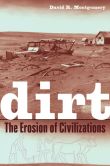Jefferson begins his letter by asserting that:
The question [w]hether one generation of men has a right to bind another … is a question of such consequences as not only to merit decision, but place also among the fundamental principles of every government…. I set out on this ground, which I suppose to be self-evident, ‘that the earth belongs in usufruct to the living’ ….Generational Sovereignty and the Land – The Earth as Tenancy-in-Common - Thomas Jefferson's Usufruct, part 1 (part 2 below)
The contemporary issue to which Jefferson’s arguments most literally apply is the problem of topsoil depletion. As a planter in predominantly agrarian Virginia, who tended to view wealth as the direct or indirect product of the earth, it was natural for Jefferson to phrase his discussions of intergenerational relations — even intergenerational economic relations — in terms of soil:
Are [later generations] bound to acknowledge [a national debt created to satisfy short-term interests], to consider the preceding generation as having had a right to eat up the whole soil of their country, in the course of a life….? Every one will say no; that the soil is the gift of God to the living, as much as it had been to the deceased generation; and that the laws of nature impose no obligation on them to pay this debt.Jefferson asserts that each generation has the right to inherit, undiminished, the same topsoil capital that its predecessors enjoyed. Our society’s failure to recognize and defend this most basic principle of intergenerational fairness during the past century has resulted in topsoil depletion that has reached crisis proportions. Soon we may have literally and irreparably “eaten up the whole soil of our country.”
Generational Sovereignty and the Land – The Earth as Tenancy-in-Common - Thomas Jefferson's Usufruct, part 2


No comments:
Post a Comment